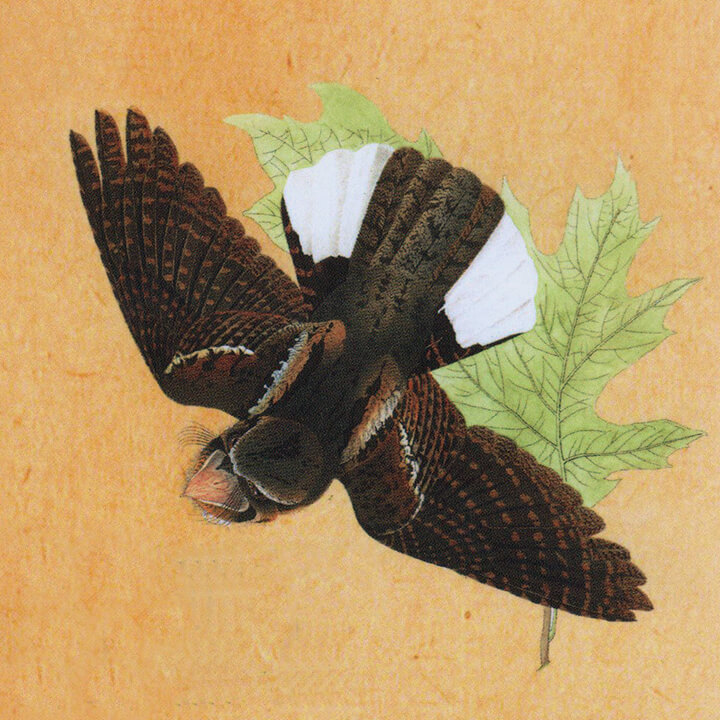John Nelson
"Who cooks for you? Who cooks for YOU all?" At dusk a Barred Owl calls from the woods behind our home in West Gloucester. Another owl responds, less articulate, a tad hysterical, a mix of bawling toddler and delirious coyote. "Who cooks aargh garg why whee y'allllll?" Closer, an Eastern Screech Owl introduces a soft, shivering whinny as a leitmotif. After a while I go back in the house to watch a news report: sickness and death statistics, grief, tear gas, rage, solidarity. Back on the deck I hear no owls, but under a full moon another voice reaches out from inside the darkness, cadenced, relentlessly determined to be heard. For moments there is no pandemic, no nation reckoning with its racial history and future, nothing but a sound beckoning in the wind. Whip-poor-will whip-poor-will whip-poor-will.

image from the front cover of Flight Calls
I love that whip-poor-wills exist. On the cover of my book Flight Calls, a beautiful Audubon painting captures their postures, a tail flashing white in flight. The chapter "Whip-poor-will Synchronicity" tells the story of a strange conjunction between a whip-poor-will in our yard, legendary local birders Jerry Soucy and Larry Jodrey, and a haunting whip-poor-will chorus at the end of William Faulkner's story "Barn Burning." The ancient sound transports me back in time, before Europeans came to North America, before the first people on our continent, moving east, reached the Mississippi River, the eons when woodlands resounded with whip-poor-wills with no humans to hear them. Native American tribes named the bird onomatopoetically. In rural novels like Marjorie Kinnan Rawlings's The Yearling and Elizabeth Madox Roberts's The Time of Man, generations pass on the knowledge that the whip-poor-will's first song signals the time for planting. Now, strangers across eastern North American are joined together at night by the same instant thrill of recognition: I hear a whip-poor-will.
The bird sings on. I've been watching a panel of six Black birders on Black Birders Week. Their discussion is delightfully ordinary. They could be any birders anywhere, telling stories and making jokes about warblers, rambunctious Blue Jays, grackles testing the boundaries of dissonance, neighborhood nightjars. It's a vision of a future to work for, a time when it will be mundane to see Black people gathered to chat about birds, a time when anyone can know the freedom to go birding without fear, the freedom to walk alone down a dark country road to get a closer listen to whip-poor-wills.
The bird is still singing when I go to bed. What songs will be part of the soundscape in my patch a century from now? Will the people who come after me know the songs of Eastern Towhees, Eastern Meadowlarks, Eastern Whip-poor-wills? I've been birding alone during this pandemic, missing old friends, never quite unentangled from anxiety, but I'm encouraged by all the people suddenly attuned to the birds around them. They share their excitement on Facebook. A Baltimore Oriole at the hummingbird feeder! My first Rose-breasted Grosbeak! Was that a whip-poor-will I heard? They're paying attention. We don't need to go on field trips to find nature. Nature is wherever we live.
When I wake before first light, the whip-poor-will is there. "Never hope more than you work," says pioneering aviator Beryl Markham in West with the Night. Whatever else it may be, the whip-poor-will's song is a work song. This bird is not giving up.